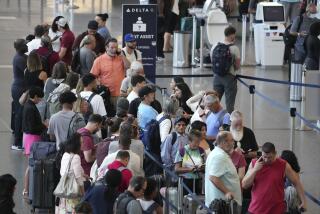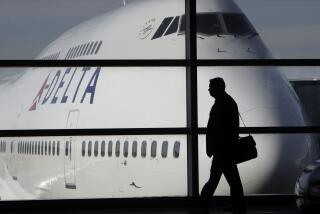Delta Slashes Dividend, Cuts Salaries by 5% : Airlines: The cost reductions are expected to save $2 billion through 1995.
The once-stellar reputation of Delta Air Lines took another hit on Thursday when the nation’s third-largest carrier announced a series of harsh steps, including a drastic cut in dividends, to restore profit.
Delta plans to cut its quarterly common stock dividend to 5 cents from 30 cents. Many had expected the carrier to eliminate the dividend altogether, as many airlines have already done.
Reacting to a deep industry slump and a costly international expansion, Delta said it will also cut non-union salaries by 5% and ask its unions to accept similar pay reductions, for about $180 million in annual savings. In addition, the carrier is seeking to delay the delivery of a larger number of aircraft than originally planned and postponing the construction of new hangars and other airport facilities.
The moves will save nearly $2 billion through 1995.
“We have never seen times like this in the airline industry,” said Delta Chairman Ronald W. Allen during a press conference at the airline’s Atlanta headquarters. “These rather dramatic moves for Delta Air Lines are designed to return us to profitability in the very near future.”
Allen also said the carrier will shift aircraft from some poorly traveled routes to more profitable ones. As an example, the airline’s recent decision to indefinitely postpone flights from Orlando to Latin America will free up aircraft to serve its profitable hub and stronghold in Atlanta.
Many hailed Delta’s efforts, including Wall Street. On the New York Stock Exchange, Delta stock rose $2.125 a share to $51.
Remy M. Fisher, transportation analyst at Kemper Securities, said Delta’s employees--the highest-paid in the industry--might be more willing to accept wage cuts in light of the dividend cut to shareholders.
Harold Sirkin, a transportation specialist with the Boston Consulting Group, said the move to cut dividends should pacify jittery employees and maintain the company’s close ties to workers during difficult times.
Saying that “ ‘we prefer to cut the dividend than to cut permanent employees’ will be a strong morale booster for all the Delta employees,” Sirkin said.
But some industry observers said the carrier needs to make even more dramatic changes and perhaps abandon some long-held traditions, including a ban on laying off permanent employees. Delta has instead laid off temporary workers and shrunk the work force through attrition and early retirement programs.
“Unless there is a quick and significant turnaround in the economy, they will have to violate some of their historical traditions,” said Jon F. Ash, managing director of Global Aviation Associates, a Washington-based aviation consulting firm. “I don’t think the traditional way of running an airline is going to survive the ‘90s.”
Delta’s traditions and profit have come under pressure as the carrier has grown from a strong regional player in the Southeast to a “mega-carrier,” with routes across the Atlantic and the Pacific. Delta’s national and international expansion has also exposed it to levels of competition from which it had been insulated.
“As a Southeastern carrier, they tended to do well. There was a lot less competition in that part of the market,” said Sirkin, but “over time, they have become less isolated.”
Delta’s recent international expansion has also run into unexpected problems. After buying Pan Am’s North Atlantic routes to Europe, Delta has found it hard to attract passengers and build an identity in markets it has never served.
More to Read
Inside the business of entertainment
The Wide Shot brings you news, analysis and insights on everything from streaming wars to production — and what it all means for the future.
You may occasionally receive promotional content from the Los Angeles Times.









